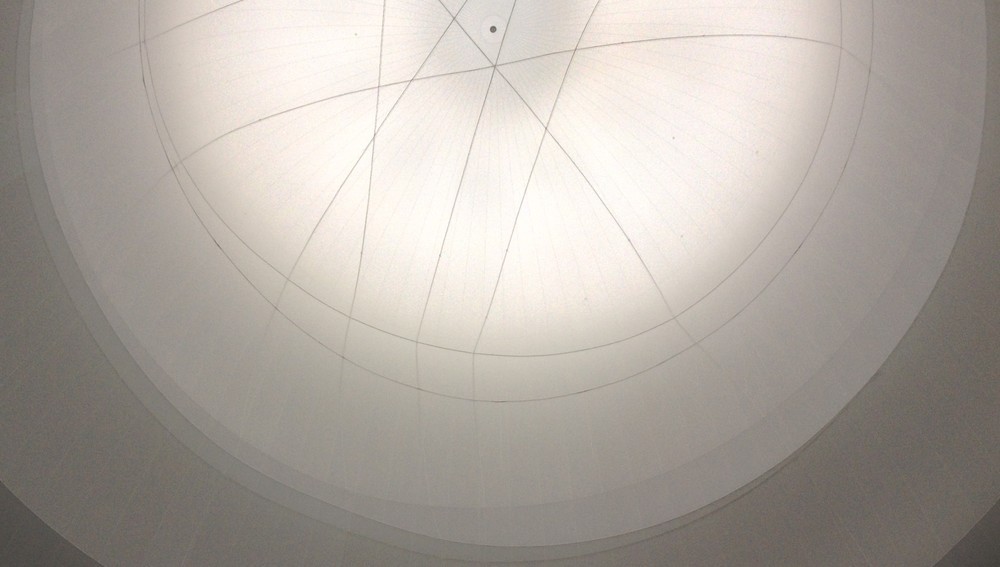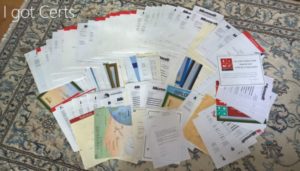Anwendungsvirtualisierung, in der Windows-Welt de-facto synonym mit App-V, ist für viele Netzwerke im Geschäftskundenbereich die Lebensversicherung schlechthin um eine vielzahl unterschiedlichster Applikationen zum Anwender zu bringen. Oft im Kontext der Remote Desktop-Dienste zu finden, kann Anwendungsvirtualisierung eigentlich noch viel mehr leisten.
Ich spreche mit dem deutschen App-V Experten Andreas Nick über seine ganz spezielle Leidenschaft und Nische, über die Entwicklungsgeschichte von Softgrid zu App-V und natürlich gönnen wir uns einen ausgedehnten Blick in die Glaskugel und mutmaßen, wie es denn nun mit der Anwendungsbereitstellung und -wartung im Zeitalter des Windows Store, der “Desktop Bridge” und anderen Ansätzen weitergehen wird.
Das Interview wurde am 27. Juni 2019 in Duisburg aufgezeichnet.
RSS-Feed: AAC | MP3
Direkter Download: AAC | MP3
Randnotizen
Kapitel
- 00:00.000 Intro: Settled Status (Jeff Speed68)
- 00:34.659 Anwendungsvirtualisierung
- 00:11:15.855 about_Andreas
- 00:14:32.393 DLL Hoelle und Co KG
- 00:23:57.869 Client/Server vs Multiuser
- 00:27:56.244 Softgrid/App-V
- 00:42:37.722 App-V Howto
- 00:54:55.395 Moderne Alternativen?
- 01:02:43.296 Project Centennial und Co
- 01:16:24.456 Die Altlast Windows
- 01:23:05.393 APP-V: Versionen Lizensierung
- 01:36:47.100 Blick in die Glaskugel
- 01:59:51.761 Outro
Musik
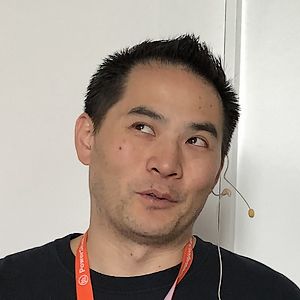
Steve Lee, Principal Software Engineer Manager for the PowerShell Team, started his career as developer on the “Internet Explorer for UNIX” team in Redmond. Later on he focussed on (remoting) technologies such as WMI/CIM, WinRM/OMI and SSH until he finally took the role of a leading manager on the PowerShell team.
Steve provides deep insights on the cultural change at Microsoft and the impact on the ecosystem PowerShell. Finally we stare into the chrystall ball to find out what’s beyond the current state of the implementation.
The interview was recorded on June 7, 2019 in Hannover.
RSS feed: AAC | MP3
Direct download: AAC | MP3
Show notes
Chapters
- 00:00:00.000 Intro (Bluemillenium: Temperate transition)
- 00:00:43.779 about_Steve
- 00:05:30.150 From WMI to CIM
- 00:13:49.779 CIM
- 00:24:02.275 OMI
- 00:30:14.015 From OMI to SSH
- 00:35:17.420 The Linux Challenge
- 00:43:31.397 Open sourcing
- 00:53:53.680 From Windows PowerShell to PowerShell 7
- 01:06:05.394 RSAT++
- 01:16:40.895 The boss enemy
- 01:20:55.092 Forecast
- 01:30:16.976 One more thing
Music
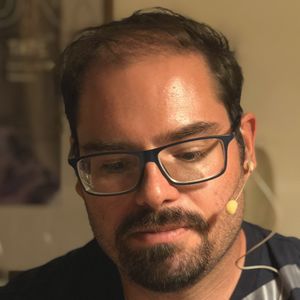
Machine Learning. Wenige Begriffe haben so viel Hype-Potential. Gleichzeitig verstehen wir so wenig von den zugrunde liegenden Forschungsergebnissen.
Ich spreche mit dem Data Scientist Dr. Uwe Stoll über die Technologie hinter den Buzzwords; wir ergründen Schlüsselelemente seines Wissenschaftsbereichs. Wir sprechen über das semantische Web, über günstige Compute-Ressourcen in Form von Grafikkarten und Cloudspeicher, über die Herausforderung GO und das Flottenmanagement der Zukunft.
Das Interview wurde am 23. August 2018 in München aufgezeichnet.
RSS-Feed: AAC | MP3
Direkter Download: AAC | MP3
Randnotizen:
Kapitel
- Intro (Demis Hassabis, NiGid: Light Embrace) 00:00:00.000
- Definition “Machine Learning” 00:01:53.186
- Rückblick: Semantic Web und das maschinenlesebare Web 00:05:27.000
- Musterinterpretation 00:11:35.734
- Deep Learning, Reinforcment Learning et al 00:23:12.142
- Werkzeugkasten 00:32:46.867
- Datenaggregation und Stimulanz 00:42:29.805
- ML im Alltag 00:58:29.470
- Blockchain 01:06:29.399
- Ausblick 01:15:46.274
Vorlesung
Musik
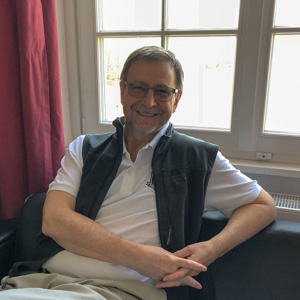
One quote to rule them all: “The renaissance of the command line”
Jeffrey Snover is not only the “father” of PowerShell, he became the iconic advocat of Microsoft’s data center focussed transformation. He is the poster child of many Microsoft focussed IT pros and enthusiasts, celebrating the improvements in command line administration as an accelerator of their own businnesses and carreers. In brief, I’d personally name him “Redmonds Godfather of Automation”.
We talk about his almost 20 years journey to establish the fundamentals of a modern datacenter and automation toolchain from his early days in Redmond, the lessons learned from wmic.exe and his vision of an OS agnostic automation framework around PowerShell (Core).
This interview was recorded during the PowerShell Conference Europe 2018 in Hannover on April 19, 2018.
RSS-Feed: AAC | MP3
Direct Download: AAC | MP3
Show notes:
Chapters
- Intro Airtone ft. Bruce Payette 0:00.000
- Welcome Jeffrey to Hannover 1:35.393
- A social shell 3:30.168
- The origin of PowerShell 6:44.219
- PowerShell 1.0 13:47.596
- From Monad to PowerShell 23:00.228
- The perfect tribe 27:51.156
- Lessons learnd from CLI 33:55.529
- Objects and APIs 41:09.367
- PowerShell Core 44:23.391
- DSC, Idempotency 52:37.439B
- Beyond PowerShell 1:03:51.250
- Glitches 1:09:34.624
- Hit refresh 1:14:55.759
- The Renaissance 1:22:58.820
- Epilogue 1:29:47.643
- about_Leibniz 1:31:07.631
References
Bonus content
- Auto generated transcript (via Amazon Transcribe): HTML
- Behind the mic (Video from the recording, Vimeo)
Music
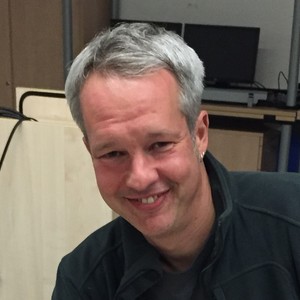
Das Active Directory ist die Basistechnologie in Microsoft-Netzwerken schlechthin. Eingeführt mit Windows 2000 erfuhr es über die Jahre vergleichsweise wenige Änderungen, weißt aber bis auf den heutigen Tag zahlreiche Merkwürdigkeiten auf, die vielen Anwendern/AdministratorInnen unbekannt sind.
Ich spreche mit Nils Kaczenski, der als Autor/Trainer/Consultant die Technologie von Beginn an begleitet, über weitsichtige Designkonzepte und Irrwege, über Vergangenes und Zukünftiges.
Dieses Interview wurde am 9. September 2017 in Lingen aufgezeichnet.
RSS-Feed: AAC | MP3
Direkter Download: AAC | MP3
Randnotizen:
Kapitel
- Stuart Kwan (AD Program Manager, Microsoft) about Migrating to Win2000 0:00.000
- Music: Paint the sky (Hansatom) 0:31.735
- Begrüssung 0:55.023
- Nils über die CIMLingen 1:43.858
- Persönliche Anfaenge 2:44.350
- Die Frühzeit des Active Directory 17:50.510
- Strukturkonzepte 26:21.248
- A(D|B)sonderlichkeiten 35:40.585
- Gruppenstrategien 49:16.438
- Meilensteine 1:10:46.139
- Die Zukunft des Active Directory? 1:18:06.368
- Outtro (Paint the sky (Hansatom) 1:24:09.109
Literatur
Musik
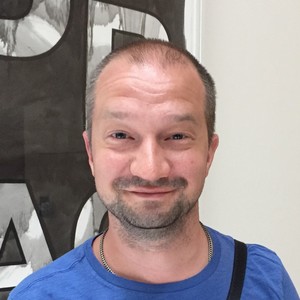
Every day more than 300.000 vulnerabilites are found in our modern operating systems. From iOS/MacOS, Android/Linux to Windows – reactive security approaches will obviously not save us from future attacks. I invited Sami Laiho in another ENGLISH episode of the Sliding Windows to explain how to turn the tables on this issue.
We focus on Window 10, starting from the choice of the proper edition, the importance of Bitlocker, Applocker (and Software Restriction Policies), Group Policies and the prerequisite of using limited user accounts, ending at project Barcelona (aka “Windows Defender Application Guard”) and the future architecture of enterprise grade OS.
This interview was recorded during the MCT Summit 2017 in Thessaloniki on June 11, 2017.
RSS-Feed: AAC | MP3
Direct Download: AAC | MP3
Show notes:
Chapters
- Intro 0:00.000
- Introducing Sami Laiho 1:28.840
- Windows vs. Linux 3:59.420
- Basic security for the mere mortals 7:22.167
- *locker and Enterprise Edition 11:31.756
- LTSB 25:00.101
- The attack surface 34:22.086
- Limited user accounts 41:19.642
- Remoting 49:26.623
- App compat 52:54.990
- Project Barcelona and beyond 59:30.876
- Wrrap up: Windows on steriods 1:06:16.338
- Resources 1:10:41.894
- Outtro & bonus content 1:13:57.136
References
Music
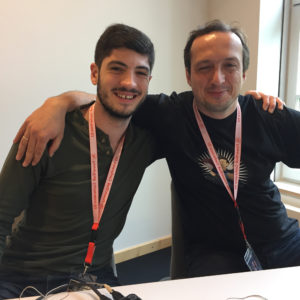
It’s nothing less than a complete change of mind: Microsoft publishes OSS (Open Source Software) on Github, delivers PowerShell to Linux, MacOS and Windows, creates platform agnostic tools – simply re-inventing itself.
I invited Joey Aiello and Bartek Bielawski to talk about this transformative change in another ENGLISH episode of the “Sliding Windows”. Joey (on the left hand side) is a program manager on Microsoft’s PowerShell team and OSS (Open Source Software) enthusiast. Bartek Bielawski, well known scripting guru, book author and systems engineer for Optiver already covered InterOp topics when it was neither mainstream nor fun.
We talk about the demand for technologies such as PowerShell, standards based remoting technologies, a tool chain spanning different OS and the love for OSS in general. Wrapping up, we focus on an OS agnostic IT, driven by APIs and layers of software beyond our traditional perception of computers and operating systems.
This interview was recorded during the PowerShell Conference EU on May 5, 2017 in Hannover.
RSS-Feed: AAC | MP3
Direct Download: AAC | MP3
Show notes:
References
Music
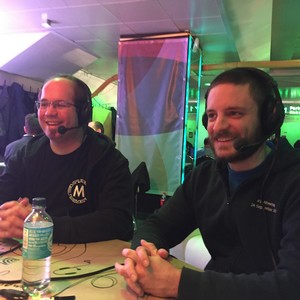
In der sechsten Episode der Sliding Windows war ich zu Gast im Sendezentrum des 33. Chaos Communications Congress, 33C3, in Hamburg. Von dieser Stelle noch mal ein herzliches Dankeschön an das Team des
Sendezentrums. Zu Gast in der “Live”-gestreamten Sendung waren
Daniel Fett und
Guido Schmitz, die beim
33C3 einen Vortrag namens “
On the Security and Privacy of Modern Single Sign-On in the Web” gehalten haben, der als Ausgangspunkt für das knapp 50-minütige Gespräch diente.
Daniel und Guido arbeiten als Sicherheitsforscher an der Uni Trier (zukünftig an der Uni Stuttgart) und forschen zu den Bereichen Sicherheit und Datenschutz im Web. Wir sprechen über Single-Sign-On-Verfahren, der Evolution von LAN zu WAN-Technologien und den verwirrenden Unterschieden im Kontext von Authentifizierung, Authorisierung und Privatheit in oAuth 1.0 und 2.0, OpenID, OpenID Connect, BrowserID (aka Mozilla Persona) und dem aus Ihrer Forschung hervorgegangenen Spresso.
Das Gespräch wurde am am 29. Dezember 2016 in Hamburg aufgezeichnet.
RSS-Feed: AAC | MP3
Direkter Download: AAC | MP3
Randnotizen
Kapitel
- 00:00:00 Intro
- 00:00:26 Begrüßung: Was ist Single-Sign-On? (Daniel, Guido)
- 00:04:44 SSO: Lan vs Web SSO (Guido, Daniel)
- 00:11:49 oAuth 1.0 (Guido, Daniel)
- 00:15:27 Terminologie (Guido, Daniel)
- 00:20:55 OpenID, OpenID Connect (Guido)
- 00:24:51 Land of Confusion (Daniel)
- 00:27:06 oAuth 2.0: Authorisierung, nicht Authentifizierung (Guido, Daniel)
- 00:32:05 Wenn man es richtig macht: OpenID Connect (Daniel)
- 00:33:51 Mozilla Persona (Guido, Daniel)
- 00:38:12 Spresso (Guido)
- 00:41:13 Erkennbare Privatheit (Daniel)
- 00:44:19 Ausblicke (Guido, Daniel)
- 00:48:37 Outtro
Musik

Die fünfte Episode der Sliding Windows führte mich in den Odenwald zu Dr. Bernhard Tritsch. Benny, von Haus aus Physiker, ist seit vielen Jahren einer der Gurus des Server Based Computings, Buchautor und vielfach ausgezeichneter IT-PRO.
Benny berichtet von seinen Anfängen in den 1990er Jahren am Genfer CERN und dem Fraunhofer Institut in Darmstadt, den ersten Berührungspunkten mit “Remote Desktops” und Anwendungsvirtualisierung und den Anfangsjahren jener Technologien, mit denen er sich Zeit seines nun mehr als 20-jährigen (IT-) Berufslebens beschäftigt.
Wir sprechen über X11, Citrix Multiuser, Winframe/Metaframe, Terminal Services und enden bei aktuellen Themen wie Consumerization und Desktop Transformation
Das Gespräch hab ich am 20. Oktober 2016 in Ober-Ramstadt aufgezeichnet.
RSS-Feed: AAC | MP3
Direkter Download: AAC | MP3
Randnotizen
- Das CERN (https://home.cern/about), “The birth of the web” (https://home.cern/topics/birth-web)
- Institut für graphische Datenverarbeitung, Darmstadt, Fraunhofer Institut (https://www.igd.fraunhofer.de/)
- X11, Das X-Windows (Wikipedia)
- Silicon Graphics, Irix (Wikipedia)
- Mosaic Browser (Wikipedia)
-
- Douglas Engelbart: The Mother of all Demos (Wikipeda, Stanford)
Tipp: Unbedingt anschauen, wer es noch nicht kennt!
- Tim Berners Lee (https://www.w3.org/People/Berners-Lee/)
- OS/2 (Wikipedia)
- Citrix Historie (PDF von citrix.com)
- Brad Peterson (LinkedIn)
- Mary Jo Foley: “Microsoft’s Windows NT turns 20“
- IBM mainframe (Wikipedia)
- Netzer und Delling (Youtube)
- Axel Ritt, Grave Digger
- Microsoft MVP Programm: Bernhard Tritsch
- Citrix Technology Program Awardees
- Keith Turnbull (LinkedIn)
- Remote FX (Technet)
- Citrix ICA Virtual Channels Overview
- Mary Jo Foley: “Microsoft to drop Azure RemoteApp in favor of Citrix virtualization technologies“
- “Let’s talk Azure RemoteApp Use Cases!” (RDS Gurus)
- VMWare Horizon
- Aldi
- Nvidia Grid , PDF: Lizensierung
- Brian Madden: “The consumerization of IT: Why most vendors get it wrong, and why it’s a challenge today.“
- Microsoft Ignite: “Get an independent insider’s view of desktop virtualization and session remoting” (Channel 9, Video)
- Virtualization Community NRW (VCNRW)
- VCNRW – Virtualization Community NRW: Neuigkeiten über Azure RemoteApp und GPU-beschleunigtes Remoting (Channel 9, Video)
- Bennies Vortrag auf dem Technical Summit 2016 in Darmstadt: “Gegenwart und Zukunft von virtuellen Desktops” (PDF)
Literatur
Musik
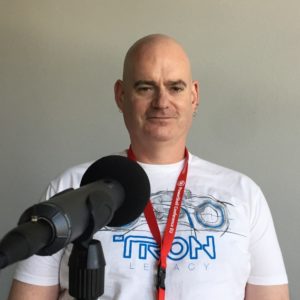
This the FIRST ENGLISH episode of the “Sliding Windows”, starring Bruce Payette. Bruce is best known as the go-to-guy of the Windows Powershell team and guru of almost any programming language (if I may quote Jeffrey Snover here).
We run through all the history of Unix oriented software in Microsoft’s ecosystem. Starting with OpenNT, later renamed to Interix, to SFU (Services for Unix) and SUA (Subsystem for Unix based applications) until we finally touch the latest chapter of the “X files”: the WSL (Windows Subsystem for Linux)
The interview was recorded in Hannover, 22th April 2016.
RSS-Feed: AAC | MP3
Direct Download: AAC | MP3
Show notes:
References
Music
